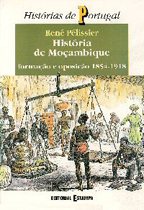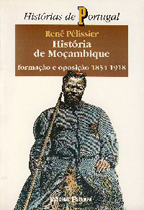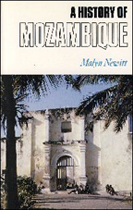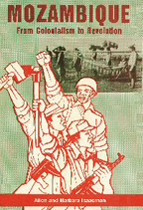Welcome to Mozambique History Net
A CALL FOR PAPERS / APELO À PARTICIPAÇÃO FROM MAPUTO
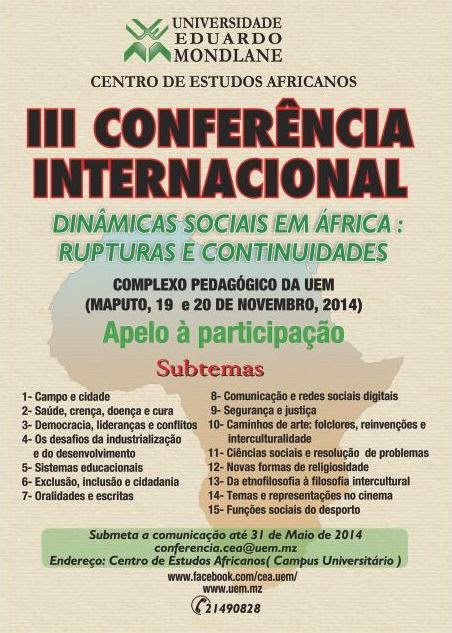
![]()
«… every file put together by a secret service (of any nation you like) is exclusively made up of press clippings». Umberto Eco, ‘Hackers, vengeurs et espions en diligence’ La Libération, 2 December 2010, available here, or here in English translation.
«Insignificance is the locus of true significance.» Roland Barthes, Le grain de la voix: entretiens 1962-1990 (Seuil, 1999).
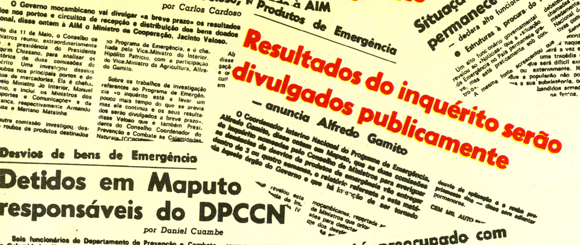
The purpose of the Mozambique History Net (MHN) website is to make available selected newspaper clippings and some other resources dealing with contemporary Mozambican history and presented in a thematically organised form. A high proportion of this material is in Portuguese. «Contemporary Mozambican history» is arbitrarily defined as the period from the beginning of a Luta de Libertação Nacional [the National Liberation Struggle, as the Mozambicans call it] or a Guerra Colonial [the Colonial War, as the Portuguese prefer] in Mozambique in the early 1960s to the advent of political pluralism in 1994. This obviously includes the conflict between the Mozambican government and Renamo from the late 1970s until October 1992, as well as the entire period of the presidency of the late Samora Machel.
The materials are organised by subject, each with its own page on this website, where each document is briefly referenced, with a link to a viewable or down-loadable PDF or JPEG file. Click on the menu on the left to go to the page that interests you.
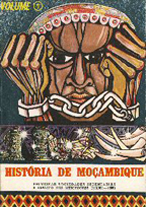
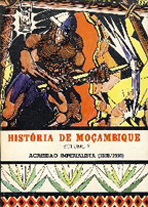
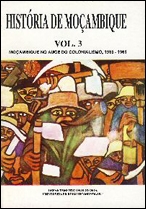
Above: the covers of the three-volume general history of Mozambique produced by the Departamento de História at the Universidade Educardo Mondlane. The first volume appeared in 1993; a subsequent second edition was published in 1999-2000. The planned fourth volume on the armed struggle never appeared.
A word of caution. Reading newspaper clippings is not the same as reading the identical text in the newspaper itself, for reasons that the French scholar Roger Chartier has delineated in his article «Languages, books and reading from the printed word to the digital text», published in Critical Inquiry in Autumn 2004 [available here]. A fundamental difference, he argues,
exists between readings of the ‘same’ text when it is moved from a printed medium to an electronic form. The case of newspapers is particularly enlightening. In the printed newspaper, the meaning the reader gives to each article depends on the presence, on the same page or in the same issue, of other articles or other elements (photographs, cartoons, advertisements, and so on). The reader constructs the meaning of the article by relating it, even unconsciously, to what precedes it, accompanies it, or follows it, and from his or her perception of the editorial intent and of the intellectual or political design that governs publication. In an electronic form, a reading of the ‘same’ article is organized out of the logical architecture that structures the domains, the themes, the headings, and the keywords. Such a reading proceeds … from an encyclopedic organization of knowledge that proposes texts to the reader that have no other context than that attributed by their belonging to a certain theme. This difference must be pointed out at a time when, in all the libraries of the world, people are discussing the need to create digital collections, in particular of newspapers and journals. Digitization projects that will enable long-distance communication are absolutely essential. But they must never lead to the abandonment or, worse, the destruction of printed works in their original form.
Clearly, this website proposes implicitly but nevertheless in a very precise way that the significance of the texts that are presented is exactly that they belong to a ‘certain theme’. Nevertheless, we’re also acutely aware that the ‘reading’ [leitura] presented on this website is not the only coherent – or even the most plausible – reading that is possible. Chartier’s warning should be heeded.
If you do not have a reader for PDF documents you can download the Adobe Reader by clicking on the icon at left; note that PDF has been an ISO open standard since July 2008, and other readers are also available, both for the Microsoft Windows platform and for non-Microsoft platforms such as Linux, Apple, and others.
Above: The covers of (from the left) the two volumes of the Portuguese translation of René Pélissier’s general history (Lisbon: Estampa, 1987); Malyn Newitt’s general history in English (London: Hurst, 1995); and the Zimbabwean edition of the general history of twentieth-century Mozambique by Allen and Barbara Isaacman (Harare: Zimbabwe Publishing House, 1985).
The Ongoing Development of MHN. There are presently about 400 physical dossiers – subject files containing press clippings mainly from Mozambican and southern African sources – which can potentially and eventually be added to the MHN website. These include such broad topics as the economy, divided into sub-categories (agriculture, energy, finance, labour, trade, and so on); education; the environment; governance (the Assembleia Popular, elections, local government); international relations (with South Africa, Portugal, the Soviet Union, the United States); politics (including Frelimo and Renamo); and social studies (including health, housing, migration, gender issues and so on). This is not an exhaustive list. If you do not see a topic that is of interest to you listed on the menu, please either contact MHN by e-mail, or use the comment functionality below.
Colin Darch
Cape Town
Friday 24 December 2010
![]()
